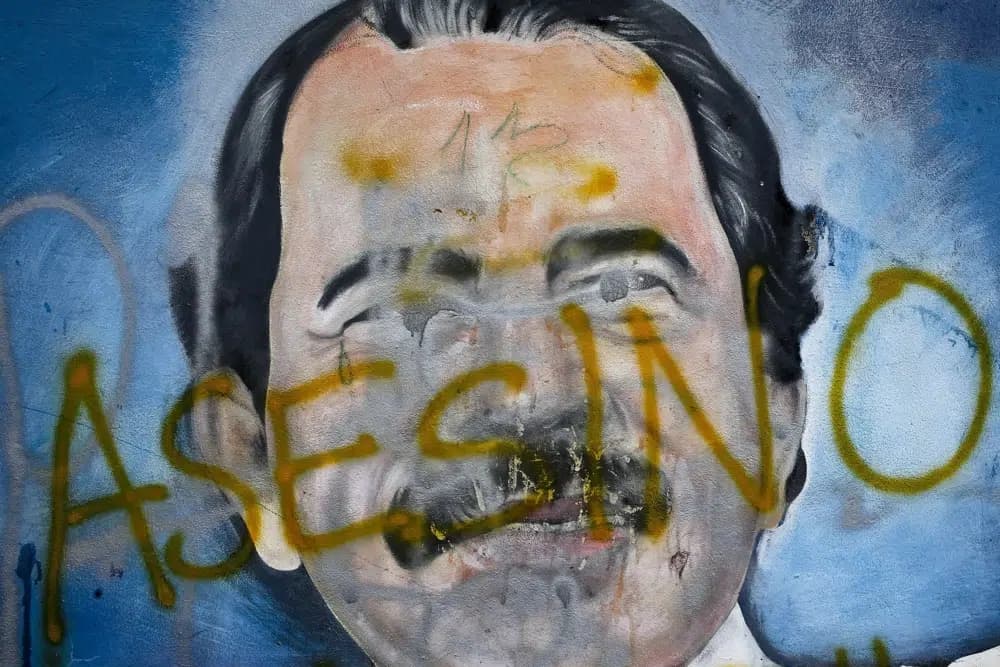NEW YORK – Members of the U.S. government’s global religious freedom watchdog have added their voices to a growing chorus of calls for the release of imprisoned Catholic leaders in Nicaragua, arguing that it’s time for legislative action against the Caribbean nation.
Frank Wolf, Commissioner of the United States Commission on International Religious Freedom, called on Congress to pass the “Restoring Sovereignty and Human Rights in Nicaragua Act of 2023.” In part, the bill would expand the U.S. government’s ability to sanction officials responsible for religious freedom and human rights violations.
“We urge the U.S. Congress to help stem these egregious religious freedom violations and hold violators accountable by passing the bipartisan Restoring Sovereignty and Human Rights in Nicaragua Act of 2023,” Wolf said in a Jan. 4 statement.
The legislation would also ensure the federal government’s support for the United Nations Group of Human Rights Experts on Nicaragua, which Wolf noted is “working diligently to investigate all alleged human rights violations and abuses in the country since 2018.
At this point, the bill has only been introduced in the Senate. Its sponsor is Republican Senator Marco Rubio of Florida, who Crux could not reach for comment. The bill’s co-sponsors are Democratic Senator Tim Kaine of Virginia, and Republican Senator Bill Cassidy of Louisiana.
Kaine urged the Senate to take up the bill in a Jan. 2 statement.
“Bishop [Rolando] Álvarez and others were unjustly detained for standing up for basic freedoms,” Kaine said. “The Senate should take up my bipartisan bills to support the unjustly detained, and hold the Ortega regime accountable for corruption, human rights abuses, and the targeting of faith leaders.”
Meanwhile, Cassidy on Jan. 3 nominated Álvarez – the bishop of Matagalpa, Nicaragua, who has been imprisoned by the Nicaraguan government for more than 500 days – and Nicaraguan opposition leader Félix Maradiaga for the Nobel Peace prize in recognition of their defense of religious freedom.
“For many years, Bishop Álvarez and Félix Maradiaga have been persecuted and falsely imprisoned for being firm and enduring voices for faith and freedom against the Ortega-Murillo regime,” Cassidy said in a statement. “I am honored to stand in support of them as they sacrifice their own freedoms to help preserve the rights of others.”
Álvarez was sentenced to 26 years in prison by the dictatorship of President Daniel Ortega last February. Little of his condition, or the conditions he’s being kept in are known other than what’s seen staged photos published by the Nicaraguan government – as was the case on Jan. 2 when Álvarez was seen receiving a medical checkup in a pink button down and gray slacks.
The recent outcry, however, is deeper than Álvarez.
It aims at the broader crackdown against Catholicism employed by the Ortega regime. In the final weeks of 2023, Bishop Isidoro del Carmen Mora Ortega of Siuna, Nicaragua was arrested allegedly for offering prayers for Álvarez, along with 15 other priests, and two seminarians.
USCIRF also noted that on Christmas Eve six former employees of Caritas – an international Catholic charitable organization – were sentenced to six years imprisonment on “dubious” money laundering charges. Since the Nicaraguan government’s crackdown on Catholicism that ramped up following 2018 protests, religious leaders and an order have been expelled from the country, and Catholic charitable organizations and educational institutions have been shuttered.
USCIRF Vice Chair Frederick Davie said the commission is “outraged” by what’s taken place. In its 2023 annual report, the commission recommended the U.S. Department of State redesignates Nicaragua a Country of Particular Concern for its “systematic, ongoing, and egregious” religious freedom violations.
“USCIRF is outraged that the Nicaraguan government has chosen to continue its brutal crackdown on members of the Catholic Church for speaking out about the religious freedom and human rights violations occurring in the country,” Davis said in a Jan. 4 statement.
“It has become increasingly clear that President Daniel Ortega and Vice President Rosario Murillo are intent on silencing the voice of any individual peacefully following the dictates of their conscience,” he said.
Archbishop Thomas Wenski of Miami, who earlier this week called the Ortega regime “off the rails,” told Crux January 4 that it’s hard to understand the end game of the Nicaraguan government’s actions, other than possibly to instill fear in the rest of the population.
“You have the Nicaraguan regime hitting the Catholic Church, and probably the reason they’re going after Catholics is that’s a good way to terrorize the population,” Wenski explained. “Because if priests and religious are not protected because of their status in a Catholic country, then the average guy on the street certainly has no protection from oppressive moves.”
Wenski added that it’s hard for the government, or anyone, to respond when the goal isn’t clear.
“If you understood the end game you could say they’re doing this and this because of that. But it doesn’t make any sense what they’re doing, so like I said they’re off the rails,” Wenski said.
Follow John Lavenburg on X: @johnlavenburg












